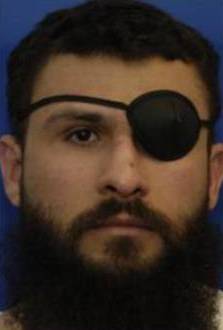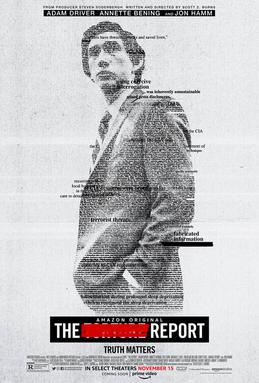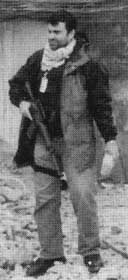
Abu Zubaydah is a Palestinian citizen born in Saudi Arabia currently held by the U.S. in the Guantanamo Bay detention camp in Cuba. He is held under the authority of Authorization for Use of Military Force Against Terrorists (AUMF).

Osama bin Laden was a Saudi Arabian-born Islamist dissident and militant leader who was the founder and first general emir of al-Qaeda, a militant terrorist organization espousing Islamism, pan-Islamism and jihadism. Bin Laden participated in the Afghan mujahideen's jihad against the Soviet Union during the Soviet–Afghan War, and supported the Bosnian mujahideen during the Yugoslav Wars. Opposed to the United States' foreign policy in the Middle East, Bin Laden declared war on the U.S. in 1996. He supervised international terrorist attacks against Americans, including the September 11 attacks inside the U.S. in 2001.

Khalid Sheikh Mohammed, often known by his initials KSM, is a Pakistani terrorist, mechanical engineer and the former Head of Propaganda for the pan-Islamist militant group al-Qaeda. He is currently held by the United States at the Guantanamo Bay detention camp under terrorism-related charges. He was named as "the principal architect of the 9/11 attacks" in the 2004 9/11 Commission Report.

George John Tenet is an American intelligence official and academic who served as the Director of Central Intelligence (DCI) for the United States Central Intelligence Agency, as well as a Distinguished Professor in the Practice of Diplomacy at Georgetown University.

A series of Islamist terrorist attacks linked to al-Qaeda were planned to occur on or near January 1, 2000, in the context of millennium celebrations, including bombing plots against four tourist sites in Jordan, the Los Angeles International Airport (LAX), USS The Sullivans, and the hijacking of Indian Airlines Flight 814.

Waterboarding is a form of torture in which water is poured over a cloth covering the face and breathing passages of an immobilized captive, causing the person to experience the sensation of drowning. In the most common method of waterboarding, the captive's face is covered with cloth or some other thin material and immobilized on their back at an incline of 10 to 20 degrees. Torturers pour water onto the face over the breathing passages, causing an almost immediate gag reflex and creating a drowning sensation for the captive. Normally, water is poured intermittently to prevent death; however, if the water is poured uninterruptedly it will lead to death by asphyxia. Waterboarding can cause extreme pain, damage to lungs, brain damage from oxygen deprivation, other physical injuries including broken bones due to struggling against restraints, and lasting psychological damage. Adverse physical effects can last for months, and psychological effects for years. The term "water board torture" appeared in press reports as early as 1976.

Ammar al-Balushi or Amar Baloch; born Ali Abdul Aziz Ali on 29 August 1977) is a Pakistani (Balochi) citizen who has been in American custody at the Guantanamo Bay detention camp since 2006. He was arrested in the Pakistani city of Karachi in 2003 before being transferred; the series of criminal charges against him include: "facilitating the 9/11 attackers, acting as a courier for Osama bin Laden and plotting to crash a plane packed with explosives into the U.S. consulate in Karachi." He is a nephew of the Pakistani terrorist Khalid Sheikh Mohammed, who served as a senior official of al-Qaeda between the late 1980s and early 2000s; and a cousin of the Pakistani terrorist Ramzi Ahmed Yousef, who played a key role in the 1993 World Trade Center bombing, the Philippine Airlines Flight 434 bombing, and the high-profile Bojinka plot.

Abdul Rahim Hussein Muhammed Abdu al-Nashiri is a Saudi Arabian citizen alleged to be the mastermind of the bombing of USS Cole and other maritime attacks. He is alleged to have headed al-Qaeda operations in the Persian Gulf and the Gulf states prior to his capture in November 2002 by the CIA's Special Activities Division.

Jose A. Rodriguez Jr. is an American former intelligence officer who served as director of the National Clandestine Service of the Central Intelligence Agency (CIA). He was the final CIA deputy director for operations (DDO) before that position was expanded to D/NCS in December 2004. Rodriguez was a central figure in the 2005 CIA interrogation videotapes destruction, leading to The New York Times editorial board and Human Rights Watch to call for his prosecution.

The Bin Laden Issue Station, also known as Alec Station, was a standalone unit of the Central Intelligence Agency in operation from 1996 to 2005 dedicated to tracking Osama bin Laden and his associates, both before and after the 9/11 attacks. It was headed initially by CIA analyst Michael Scheuer and later by Richard Blee and others.
"Enhanced interrogation techniques" or "enhanced interrogation" was a program of systematic torture of detainees by the Central Intelligence Agency (CIA), the Defense Intelligence Agency (DIA) and various components of the U.S. Armed Forces at remote sites around the world—including Abu Ghraib, Bagram, Bucharest, and Guantanamo Bay—authorized by officials of the George W. Bush administration. Methods used included beating, binding in contorted stress positions, hooding, subjection to deafening noise, sleep disruption, sleep deprivation to the point of hallucination, deprivation of food, drink, and medical care for wounds, as well as waterboarding, walling, sexual humiliation, rape, sexual assault, subjection to extreme heat or extreme cold, and confinement in small coffin-like boxes. A Guantanamo inmate's drawings of some of these tortures, to which he himself was subjected, were published in The New York Times. Some of these techniques fall under the category known as "white room torture". Several detainees endured medically unnecessary "rectal rehydration", "rectal fluid resuscitation", and "rectal feeding". In addition to brutalizing detainees, there were threats to their families such as threats to harm children, and threats to sexually abuse or to cut the throat of detainees' mothers.
Hassan Ghul, born Mustafa Hajji Muhammad Khan, was a Saudi-born Pakistani member of al-Qaeda who revealed the kunya of Osama bin Laden's messenger, which eventually led to Operation Neptune Spear and the death of Osama Bin Laden. Ghul was an ethnic Pashtun whose family was from Waziristan. He was designated by the Al-Qaida and Taliban Sanctions Committee of the Security Council in 2012.

John Chris Kiriakou is an American author, journalist and former intelligence officer. Kiriakou is a columnist with Reader Supported News and co-host of Political Misfits on Sputnik Radio. He was jailed for exposing the interrogation techniques of the U.S. government.
The CIA interrogation videotapes destruction occurred on November 9, 2005. The videotapes were made by the United States Central Intelligence Agency (CIA) during interrogations of al-Qaeda suspects Abu Zubaydah and Abd al-Rahim al-Nashiri in 2002 at a CIA black site prison in Thailand. Ninety tapes were made of Zubaydah and two of al-Nashiri. Twelve tapes depict interrogations using "enhanced interrogation techniques", a euphemism for torture. The tapes and their destruction became public knowledge in December 2007. A criminal investigation by a Department of Justice special prosecutor, John Durham, decided in 2010 to not file any criminal charges related to destroying the videotapes.
Deuce Martinez is an American intelligence professional. "Deuce" is not his given first name, but a nickname that was used in the first newspaper article naming him. He was involved at the start of the Central Intelligence Agency's Rendition, Detention and Interrogation program of "high-value detainees," including Abu Zubaydah, Ramzi bin al-Shibh, Abd al-Rahim al-Nashiri, and Khalid Sheikh Mohammed.

Abu Zubaydah is a Saudi citizen who helped manage the Khalden training camp in Afghanistan. Captured in Pakistan on March 28, 2002, he has since been held by the United States as an enemy combatant. Beginning in August 2002, Abu Zubaydah was the first prisoner to undergo enhanced interrogation techniques. There is disagreement among government sources as to how effective these techniques were; some officials contend that Abu Zubaydah gave his most valuable information before they were used; CIA lawyer John Rizzo said he gave more material afterward.
In the aftermath of the September 11 attacks on New York City and Washington, D.C., by the al-Qaeda terrorist group, a number of investigations were conducted to determine what intelligence may have existed before the attacks and whether this information was ignored by authorities.

Manhunt: The Search for Bin Laden is a 2013 documentary film directed by Greg Barker that explores the Central Intelligence Agency's investigation of Osama bin Laden, starting from 1995 until his death in 2011. It premiered on HBO on May 1, 2013, two years after the mission that killed bin Laden. The documentary features narratives by many of the CIA analysts and operatives who worked over a decade to understand and track bin Laden, and includes archival film footage from across Washington, D.C., Pakistan, Saudi Arabia and elsewhere in the Middle East. It also features extensive and rarely seen footage of Al-Qaeda training and propaganda videos, including video suicide notes from various terrorists who later worked as suicide bombers.
Alfreda Frances Bikowsky is a Central Intelligence Agency (CIA) officer who has headed the Bin Laden Issue Station and the Global Jihad unit. Bikowsky's identity is not publicly acknowledged by the CIA, but was deduced by independent investigative journalists in 2011. In January 2014, the Washington Post named her and tied her to a pre-9/11 intelligence failure and the extraordinary rendition of Khalid El-Masri. The Senate Intelligence Committee report on CIA torture, released in December 2014, showed that Bikowsky was not only a key part of the torture program but also one of its chief apologists, resulting in the media's giving her the moniker "The Unidentified Queen of Torture."

The Report is a 2019 American historical political drama film written and directed by Scott Z. Burns that stars Adam Driver, Annette Bening, Jon Hamm, Ted Levine, Michael C. Hall, Tim Blake Nelson, Corey Stoll, and Maura Tierney. It depicts the efforts of staffer Daniel Jones as he led the Senate Intelligence Committee's investigation of the Central Intelligence Agency's use of torture following the September 11th attacks, covering more than a decade's worth of real-life political intrigue related to the contents, creation, and release of the 6,700-page Senate Intelligence Committee report on CIA torture.














